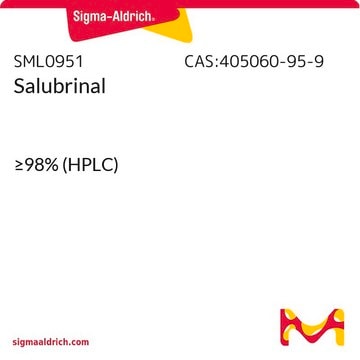580549
Tauroursodeoxycholic Acid, Sodium Salt
Tauroursodeoxycholic is a detergent useful for the solubilization of lipids and membrane-bound proteins.
Synonym(s):
Tauroursodeoxycholic Acid, Sodium Salt, Sodium Tauroursodeoxycholate
About This Item
Recommended Products
Quality Level
Assay
≥97% (TLC)
form
solid
manufacturer/tradename
Calbiochem®
storage condition
OK to freeze
color
white
solubility
water: 100 mg/mL
shipped in
ambient
storage temp.
15-25°C
InChI
1S/C26H45NO6S/c1-16(4-7-23(30)27-12-13-34(31,32)33)19-5-6-20-24-21(9-11-26(19,20)3)25(2)10-8-18(28)14-17(25)15-22(24)29/h16-22,24,28-29H,4-15H2,1-3H3,(H,27,30)(H,31,32,33)/t16-,17+,18-,19-,20?,21?,22+,24?,25+,26-/m1/s1
InChI key
BHTRKEVKTKCXOH-AYSJQVDDSA-N
Related Categories
General description
Application
- Inhibition of endoplasmic reticulum stress combined with activation of angiotensin-converting enzyme 2: novel approach for the prevention of endothelial dysfunction in type 1 diabetic rats.: This study highlights the efficacy of tauroursodeoxycholic acid, sodium salt in reducing endoplasmic reticulum stress, suggesting its utility in preventing vascular complications in diabetes (Gaikwad AB et al., 2022).
Warning
Other Notes
Miyake, H., et al. 1999. Dig. Dis. Sci.44, 197.
Eto, T. and Tompkins, R.K. 1985. Am. J. Surg.150, 564.
Legal Information
Storage Class Code
11 - Combustible Solids
WGK
WGK 3
Flash Point(F)
Not applicable
Flash Point(C)
Not applicable
Certificates of Analysis (COA)
Search for Certificates of Analysis (COA) by entering the products Lot/Batch Number. Lot and Batch Numbers can be found on a product’s label following the words ‘Lot’ or ‘Batch’.
Already Own This Product?
Find documentation for the products that you have recently purchased in the Document Library.
Customers Also Viewed
Our team of scientists has experience in all areas of research including Life Science, Material Science, Chemical Synthesis, Chromatography, Analytical and many others.
Contact Technical Service












![PERK Inhibitor I, GSK2606414 GSK2606414 is a cell-permeable, highly potent inhibitor of EIF2AK3/PERK (IC₅₀ = 0.4 nM; [ATP] = 5 µM). Targets PERK in its inactive DFG conformation at the ATP-binding region.](/deepweb/assets/sigmaaldrich/product/structures/180/559/efa716dc-d5fe-4339-a6f0-0103084fc04a/640/efa716dc-d5fe-4339-a6f0-0103084fc04a.png)